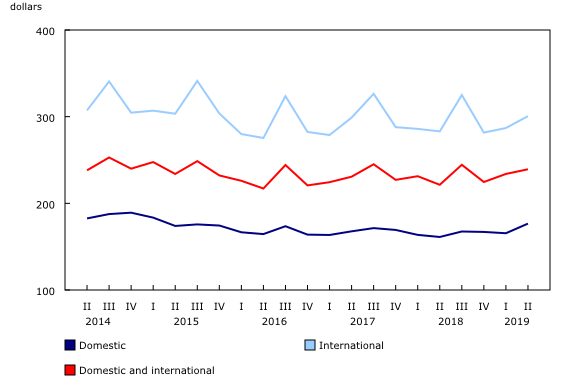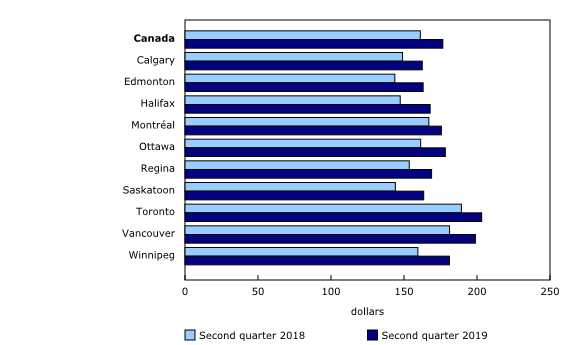Air fares, second quarter 2019
Archived Content
Information identified as archived is provided for reference, research or recordkeeping purposes. It is not subject to the Government of Canada Web Standards and has not been altered or updated since it was archived. Please "contact us" to request a format other than those available.
Released: 2019-12-16
$239.30
Second quarter 2019
8.1% 
(year-over-year change)
Base air fares in Canada, domestic and international combined, averaged $239.30 in the second quarter, up 8.1% from the same quarter in 2018, marking the second consecutive quarterly increase. This was the highest level for a second quarter since 2013, when base air fares averaged $247.10.
Base fares do not include the goods and services tax, air transportation taxes or user fees, such as airport improvement fees or fuel surcharges on international trips. Average air fares are calculated for each flight stage—that is, when the passenger boards the aircraft at one airport and departs the aircraft at another airport.
The upturn in air fares in the second quarter of 2019 was largely related to the reduced operational aircraft capacity caused by the grounding of all Boeing 737 MAX aircraft in March. To compensate for the loss of aircraft, the airlines implemented different measures such as the cancellation and suspension of several routes, adjustments to the frequency of flights and aircraft substitutions. The forced grounding also resulted in extra costs associated with replacement aircraft such as aircraft leasing, additional maintenance work and increased fuel consumption by less efficient planes. To help offset these costs, the major Canadian airlines have pushed base air fares up.
Air fares in the domestic sector surge in the wake of the MAX's grounding
The average domestic fare was up 9.6% from the second quarter of 2018 to $176.60. This followed a 1.2% gain in the first quarter of 2019 and represented the largest year-over-year quarterly increase in the last eight years. The increase in the domestic sector was driven by double-digit growth for both short-haul and long-haul trips. The average international fare also continued to grow in the second quarter of 2019, albeit at a slower pace (+6.2% to $300.60).
The rise in average domestic air fares was widespread across all selected cities where passengers boarded the plane (enplanement). Increases ranged from 5.1% in Montréal to 13.9% in Halifax.
Toronto ($203.20) remained the city with the highest average domestic air fare, followed by Vancouver ($198.90), Winnipeg ($181.10) and Ottawa ($178.30). These four cities recorded average domestic fares above the national average. Meanwhile, Calgary ($162.50) and Edmonton ($163.10) posted the lowest average domestic air fares, edging out Saskatoon ($163.50), which had the lowest fares for the previous three quarters.
Note to readers
Average air fares are base fares and do not include the goods and services tax, air transportation taxes or user fees, such as airport improvement fees or fuel surcharges. All fares in this release are base fares.
Average air fares are calculated for each flight stage. When the passenger boards the aircraft at one airport and departs the aircraft at another airport, this is considered a flight stage.
The Fare Basis Survey covers Air Canada (including Air Canada Rouge, Jazz, and Air Canada's Canadian regional code-share partners), Air Transat and WestJet.
The data in this quarterly release are not seasonally adjusted.
The Fare Basis Survey is being redesigned.
Contact information
For more information, or to enquire about the concepts, methods or data quality of this release, contact us (toll-free 1-800-263-1136; 514-283-8300; STATCAN.infostats-infostats.STATCAN@canada.ca) or Media Relations (613-951-4636; STATCAN.mediahotline-ligneinfomedias.STATCAN@canada.ca).
- Date modified:



